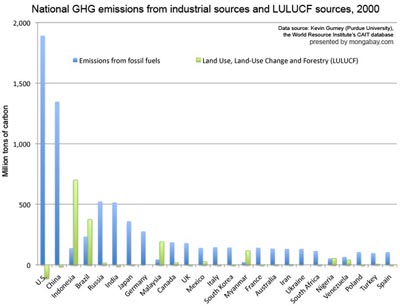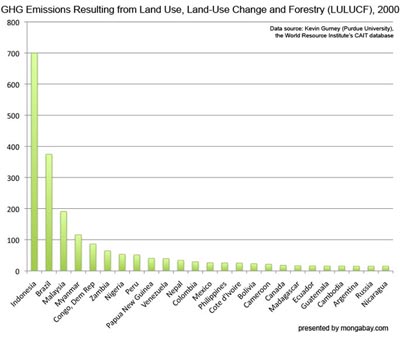In testimony before the Senate Foreign Relations Committee on Wednesday, former Vice President Al Gore urged lawmakers to move swiftly on a cap-and-trade climate bill as well as the economic stimulus package. Among many recommendations, Gore repeatedly emphasized the importance of forest conservation in fighting climate change, mentioning “deforestation” more than a dozen times.
He said reducing emissions from deforestation and degradation (REDD) may be a way to involve developing countries in efforts to cut greenhouse gas emissions. He cited Brazil and Indonesia as key partners.
“Developing countries that were once reluctant to join in the first phases of a global response to the climate crisis have themselves now become leaders in demanding action and in taking bold steps on their own initiatives,” he said in a prepared statement before taking questions from the committee. “Brazil has proposed an impressive new plan to halt the destructive deforestation in that nation. Indonesia has emerged as a new constructive force in the talks.”
 Emissions from industrial sources and deforestation (and other land use).
|
Gore said the inclusion of deforestation is key to a successful agreement in Copenhagen this December. The Copenhagen talks will determine a climate treaty to succeed the Kyoto Protocol.
Tropical forest conservation is increasingly seen as a promising way to reduce anthropogenic greenhouse gas emissions. Deforestation accounts for nearly a fifth of such emissions. In some countries, including Brazil and Indonesia, deforestation is the leading source of carbon dioxide emissions.
Supporters say the REDD mechanism could eventually generate billions of dollars per year for forest conservation and sustainable development in tropical countries. Some would like to see REDD linked to carbon markets, while others would like the mechanism based on non-market contributions from polluting countries.
Al Gore’s Statement to the Senate Foreign Relations Committee
We are here today to talk about how we as Americans and how the United States of America as part of the global community should address the dangerous and growing threat of the climate crisis.
We have arrived at a moment of decision. Our home – Earth – is in grave danger. What is at risk of being destroyed is not the planet itself, of course, but the conditions that have made it hospitable for human beings.
Moreover, we must face up to this urgent and unprecedented threat to the existence of our civilization at a time when our country must simultaneously solve two other worsening crises. Our economy is in its deepest recession since the 1930s. And our national security is endangered by a vicious terrorist network and the complex challenge of ending the war in Iraq honorably while winning the military and political struggle in Afghanistan.
As we search for solutions to all three of these challenges, it is becoming clearer that they are linked by a common thread – our dangerous over-reliance on carbon-based fuels. As long as we continue to send hundreds of billions of dollars for foreign oil – year after year – to the most dangerous and unstable regions of the world, our national security will continue to be at risk.
As long as we continue to allow our economy to remain shackled to the OPEC rollercoaster of rising and falling oil prices, our jobs and our way of life will remain at risk.
Moreover, as the demand for oil worldwide grows rapidly over the longer term, even as the rate of new discoveries is falling, it is increasingly obvious that the roller coaster is headed for a crash. And we’re in the front car.
Most importantly, as long as we continue to depend on dirty fossil fuels like coal and oil to meet our energy needs, and dump 70 million tons of global warming pollution into the thin shell of atmosphere surrounding our planet, we move closer and closer to several dangerous tipping points which scientists have repeatedly warned – again just yesterday – will threaten to make it impossible for us to avoid irretrievable destruction of the conditions that make human civilization possible on this planet.
We’re borrowing money from China to buy oil from the Persian Gulf to burn it in ways that destroy the planet. Every bit of that’s got to change.
For years our efforts to address the growing climate crisis have been undermined by the idea that we must choose between our planet and our way of life; between our moral duty and our economic well being. These are false choices. In fact, the solutions to the climate crisis are the very same solutions that will address our economic and national security crises as well.
In order to repower our economy, restore American economic and moral leadership in the world and regain control of our destiny, we must take bold action now.
The first step is already before us. I urge this Congress to quickly pass the entirety of President Obama’s Recovery package. The plan’s unprecedented and critical investments in four key areas – energy efficiency, renewables, a unified national energy grid and the move to clean cars – represent an important down payment and are long overdue. These crucial investments will create millions of new jobs and hasten our economic recovery – while strengthening our national security and beginning to solve the climate crisis.
Quickly building our capacity to generate clean electricity will lay the groundwork for the next major step needed: placing a price on carbon. If Congress acts right away to pass President Obama’s Recovery package and then takes decisive action this year to institute a cap-and-trade system for CO2 emissions – as many of our states and many other countries have already done – the United States will regain its credibility and enter the Copenhagen treaty talks with a renewed authority to lead the world in shaping a fair and effective treaty. And this treaty must be negotiated this year.
Not next year. This year.
A fair, effective and balanced treaty will put in place the global architecture that will place the world – at long last and in the nick of time – on a path toward solving the climate crisis and securing the future of human civilization.
I am hopeful that this can be achieved. Let me outline for you the basis for the hope and optimism that I feel.
The Obama Administration has already signaled a strong willingness to regain U.S.leadership on the global stage in the treaty talks, reversing years of inaction. This is critical to success in Copenhagen and is clearly a top priority of the administration.
Developing countries that were once reluctant to join in the first phases of a global response to the climate crisis have themselves now become leaders in demanding action and in taking bold steps on their own initiatives. Brazil has proposed an impressive new plan to halt the destructive deforestation in that nation. Indonesia has emerged as a new constructive force in the talks. And China’s leaders have gained a strong understanding of the need for action and have already begun important new initiatives.
Heads of state from around the world have begun to personally engage on this issue and forward-thinking corporate leaders have made this a top priority.
More and more Americans are paying attention to the new evidence and fresh warnings from scientists. There is a much broader consensus on the need for action than there was when President George H.W. Bush negotiated – and the Senate ratified – the Framework Convention on Climate Change in 1992 and much stronger support for action than when we completed the Kyoto Protocol in 1997.
The elements that I believe are key to a successful agreement in Copenhagen include:
– Strong targets and timetables from industrialized countries and differentiated butbinding commitments from developing countries that put the entire world under a system with one commitment: to reduce emissions of carbon dioxide and otherglobal warming pollutants that cause the climate crisis;
– The inclusion of deforestation, which alone accounts for twenty percent of the emissions that cause global warming;
– The addition of sinks including those from soils, principally from farmlands and grazing lands with appropriate methodologies and accounting. Farmers and ranchers in the U.S. and around the world need to know that they can be part of
the solution;
– The assurance that developing countries will have access to mechanisms and resources that will help them adapt to the worst impacts of the climate crisis and technologies to solve the problem; and,
– A strong compliance and verification regime.
The road to Copenhagen is not easy, but we have traversed this ground before. We have negotiated the Montreal Protocol, a treaty to protect the ozone layer, and strengthened it to the point where we have banned most of the major substances that create the ozone hole over Antarctica. And we did it with bipartisan support. President Ronald Reagan and Speaker of the House Tip O’Neill joined hands to lead the way.
Let me now briefly discuss in more detail why we must do all of this within the next year, and with your permission Mr. Chairman, I would like to show a few new pictures that illustrate the unprecedented need for bold and speedy action this year.
Thank you Mr. Chairman. I am eager to respond to any questions that you and the members of the committee have.
Related articles
Deal on forests falls short
(12/11/2008)
A deal reached Wednesday in Poznan to include forests in future climate treaties is a positive step but falls short of the progress needed to get the REDD (reducing emissions from deforestation and degradation) mechanism on track for incorporation into the framework that will succeed the Kyoto Protocol, say environmentalists speaking from the talks.
Forest conservation can fight climate change and poverty
(10/08/2008)
The Forests Dialogue — a coalition consisting of more than 250 representatives of governments, forestry companies, trade unions, environmental and social groups, international organizations, forest owners, indigenous peoples and forest-community groups — has issued guiding principles for including forests in climate change negotiations.
Cutting deforestation can fight climate change, reduce poverty and conflict
(09/24/2008)
Forest conservation can play a critical role in efforts to reduce greenhouse gas emissions and alleviate poverty, said a prominent group of politicians, development experts, and environmental NGOs meeting in New York City to discuss U.S. climate policy. Organized by Avoided Deforestation Partners, an international policy group, the meeting sought to establish a strategy to highlight the global impact of deforestation and push for the inclusion of tropical forests in domestic climate policy. Attendees included leaders of WWF, the Nature Conservancy, Conservation International, World Vision, Oxfam, Mercy Corps, Care International, and the Union of Concerned Scientists; former Vice President Al Gore; Wangari Maathai, a Nobel Prize-winning activist from Kenya; Bharrat Jagdeo, president of the South American country of Guyana; and executives from a number of carbon-trading and financial firms. The event was hosted by veteran journalist Dan Rather.

U.S. climate policy could help save rainforests
(05/14/2008)
U.S. policy measures to fight global warming could help protect disappearing rainforests, says the founding partner of an “avoided deforestation” policy group. In an interview with mongabay.com, Jeff Horowitz of the Berkeley-based Avoided Deforestation Partners argues that U.S. policy initiatives could serve as a catalyst for the emergence and growth of a carbon credits market for forest conservation. REDD or Reducing Emissions from Deforestation and Degradation is a proposed policy mechanism that would compensate tropical countries for safeguarding their forests. Because deforestation accounts for around a fifth of global greenhouse gas emissions, efforts to reduce deforestation can help fight climate change. Forest protection also offers ancillary benefits like the preservation of ecosystem services, biodiversity, and a homeland for indigenous people.















